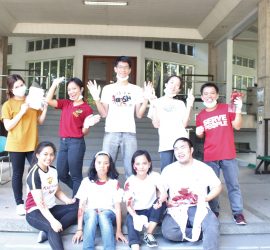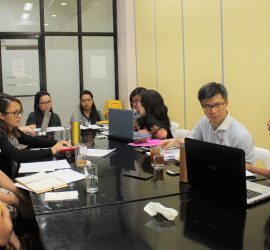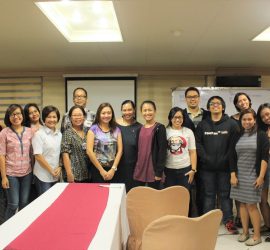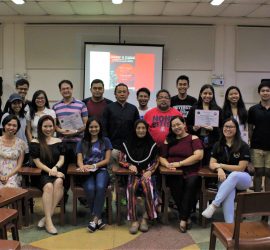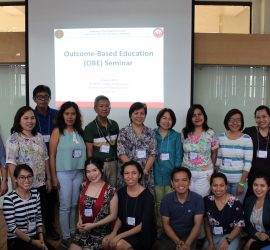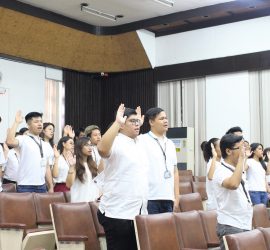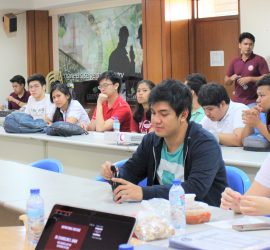The National Service Reserve Corps Diliman (NSRC) seeks to empower its pool of volunteers to become responsible citizens and take up leadership roles in improving the quality of environment and combat the damaging effects of disasters especially on vulnerable populations. The organization in partnership with the Office of the Vice Chancellor for Community Affairs initiated a project entitled: “Preparing NSRC Reservists as First Responders.” Philippine Red Cross (PRC), Quezon City chapter facilitated the four-day training which centered on Occupational First Aid and Disaster Risk Reduction Management (DRRM). The training which was held on October 14-15 and November 4-5, 2018 aimed to equip members of NSRC Diliman with practical knowledge and skills that are essential for them to be mobilized as First Responders who will act as first link in emergency medical services during disaster and help raise awareness on DRRM in the university. Reservists who volunteered to be part of the activity had a total of 32-hour hands-on training and practice which included hazard management during disasters, treating wounds and burns, recognizing and controlling bleeding, immobilizing fractures, moving and lifting victims and other basic lifesaving skills. Participants who have completed the training received a first aid certificate and license from the PRC and they will form part of the pioneer group of NSRC Diliman First Responders. by Vianne Grace C. Delfinado
NEWS
For the year 2018, the NSTP Diliman Office, through the Academic Program Improvement Grant, undertook a project that is entitled “Synchronizing NSTP and NSRC towards the mobilization of UPD SRC.” Said project aimed to develop a mechanism that will sustain the sense of volunteerism in every NSTP student even after they have finished the course. The Office acknowledges the diversity of extension services in the University which can be tapped for the mobilization of the reservists who, in turn, can be great resources in the implementation of the colleges’ extension programs. In line with this, among the objectives of the project are: 1) to enhance NSTP programs to strengthen the capacity of the colleges offering NSTP in maximizing the potential of the students in carrying out the programs spearheaded by the extension offices; and 2) to come up with a policy recommendation to establish a mechanism for the reservists to carry on with their commitment of service. To this end, various data gathering methods were employed to acquire relevant information for the crafting of the policy recommendation. Activities and programs of the extension offices were gathered and organized into a database to predetermine if there are any volunteer needs that the reservists may fill and to evaluate if the opportunities present can provide a fulfilling and enriching experience to the students. Thereafter, an interview was conducted among extension heads who are willing to forge partnership with NSTP Diliman Office in this project. On October 29, 2018, a simultaneous workshop of clustered NSTP college coordinators with extension heads and representatives was held to explore possible programs that may strengthen the partnership between the NSTP Office and extension offices and also to discuss the recommended provisions that will form part of the policy recommendation.This policy has been created to ensure that all potential volunteers will be treated in a fair and consistent way. It should also aid in understanding what support is available to them and what they can expect from their volunteering experience. Moreover, it will serve as a guide on how to properly integrate the volunteers into the organizational structure […]
As a result of the recommendation during the OBE Seminar held last August 31, 2018, the NSTP Diliman Office conducted a Program Mapping Workshop aimed to produce the NSTP Program Map that conforms to Outcome-Based Education (OBE) principles on October 19, 2018 at the University Hotel, UP Diliman. Prof. Rosella M. Torrecampo of the Office for the Advancement of Teaching (OAT), UP Diliman facilitated the whole-day workshop which was attended by NSTP Coordinators and Instructors. A short discussion preceded the event where Prof. Torrecampo reviewed the principles and applications of OBE in producing instructional materials and program maps. It was followed by grouping the participants for the program mapping. The Program Map Matrix for the activity that contained the categories below was provided by Prof. Torrecampo to be filled out by the groups. Each group workshopped on the following: Graduate attributes; NSTP Implementing Rules and Regulations (IRR); UP System Institutional Learning Outcomes; Program Goals; Program Learning Outcomes (The student will be able to…) Program Indicators of the Enabling Outcomes (The student will be able to…) Learning Outcomes (Attitude, Skill, Knowledge) and Domains (Cognitive, Affective, Psychomotor) The groups came up with the three key main graduate attributes listed with other characteristics during the OBE Seminar: nationalistic, visionary, and competent. The UP System Institutional Learning Outcomes, UP Diliman Institutional Learning Outcomes, NSTP Implementing Rules and Regulations, UP Diliman NSTP Implementing Guidelines were also reviewed and selected to provide grounding for the key graduate attributes, the program goals and outcomes. Each group reported on the completed program matrix at the end of the day’s session. Due to the limited amount of time, Dr. Torrecampo suggested to have another session for the harmonization of the group outputs. by Klaribelle Anne B. Languayan
“The greatest cost of the siege is our identity.” This has been emphasized by Prof. Dalumabi Lao Bula, retired professor of Social Science and Humanities in Mindanao State University, over the stretch of the forum entitled “Karanasan sa Karahasan: Pagbabahagi ng mga Personal na Danas sa Batas Militar at Karahasan sa Mindanao.” The said forum was organized by the National Service Training Program (NSTP) Diliman Office, in cooperation with the College of Social Work and Community Development and College of Social Sciences and Philosophy – NSTP. The forum was held on September 27-28,2018 at Palma Hall 400, University of the Philippines Diliman. Prof. Bula further added that their identities as “Maranao,” which means “People of the Lake,” is centered upon the Lake Lanao whose richness of depths provide water, livelihood, transportation and electricity to the inhabitants of its shores. More than the vital role of the Lake in the daily lives of the locals, it greatly shaped the culture and history of Maranaos. Since Marawi’s liberation, Prof. Bula informed the audience that no debris cleaning has been conducted in the ground zero. There are plans to transform the area into a metropolis and build military camps, but these plans failed to include rehabilitation for private citizens whose families and properties have been greatly damaged by the conflict. Currently, she estimated that around 20 percent of the affected families remain in evacuation centers while the remaining 80 percent are either renting a place or residing with relatives. Since the end of the Marawi siege, its residents remain barred from entering the most affected barangays while actors were allowed to shoot some of their movie scenes in the area. According to Prof. Bula, this systematic forced displacement of Maranaos from their homes is a violation of their human rights. As a result, they were not able to practice some of their most honored traditions as Muslims. They were not allowed to look for nor bury their dead. Neither call to prayer nor feasts have been held to celebrate the end of Ramadan in their homes. As an internally displaced person herself, Prof […]
A whole day Outcome-Based Education (OBE) Seminar Workshop was held last 31 August 2018 at the G.E. Theater, College of Engineering, UP Diliman for NSTP instructors from different colleges. NSTP Diliman Director Prof. Arlyn Macapinlac, during her welcome remarks, emphasized the need to continuously improve the existing NSTP Common Module. As the university calls to conform with Outcome-Based Education principles, the NSTP Diliman Office deemed it fit to follow suit. It is directed towards producing an “OBEdized” syllabus. Dr. Amelia Fajardo of the Curriculum Studies Department of the College of Education, UP Diliman, served as the resource person for the seminar-workshop. The following were discussed during the seminar: Differentiation of curriculum from instruction The relationship of curriculum to instruction Three domains of curriculum Bases for the determination of the elements of the curriculum Important features of OBE How to formulate OBE learning objectives Curriculum and instruction were differentiated from each other using the rosary and the puzzle ideology; the rosary as a prescriptive model of curriculum following a specific order of instruction, while the puzzle as a student-based curriculum which reflects that instruction depends upon the player. It was noted that there is no instruction if there is no curriculum, hence, a crafted curriculum is important in order to proceed with standardized instruction. It was also clarified that instruction is not a way of teaching, but a plan which answers to the elements’ learning intent, learning content, teaching strategy, and assessment. From this, Dr. Fajardo shared that curriculum development is defined as a decision-making process on these four elements of the curriculum. Further, factors that influence the curriculum are philosophy of education, socio-cultural context, theories of learning, and the demands of the industry or profession. The afternoon session was continued at the Maynilad Room of the College of Engineering, UP Diliman. Before the workshop proper, Dr. Fajardo lectured on the formulation of OBE objectives and program. The first task of the workshop is to envision the ideal characteristics of the NSTP graduates based on the NSTP program vision, mission, and goals (VMG). Program outcomes, which correspond to the measurable […]
Around 1,161 students of the University of the Philippines Diliman (UPD) who completed the course requirements under the National Service Training Program (NSTP) for the second semester of A.Y. 2017-18 received their certificates of recognition: 1,110 CWTS and LTS graduates were inducted as new members of the National Service Reserve Corps (NSRC) of the Philippines while 51 ROTC graduates were inducted as Reservists under the Department of National Defense. Commencement ceremonies were held by different schools and colleges for the graduates of their NSTP classes. The program includes video presentations featuring community engagement by the NSTP classes. Partner organizations who were vital to the implementation of NSTP class projects were also recognized during the program. For example, one NSTP class from the College of Fine Arts produced a kids’ coloring book for the Reception and Study Center for Children (RSCC) under DSWD. LTS classes from the College of Social Sciences and Philosophy and College of Education partnered with San Vicente Elementary School for literacy projects. On May 17, 2018, the College of Engineering held its commencement ceremony for the 241 graduates of its NSTP program at the Industrial Engineering Auditorium. The program started at 9 am and ended at 12 noon. NSTP College Coordinator Raymond Freth Lagria gave the opening remarks while College of Engineering Dean Dr. Rizalinda De Leon attended the ceremony and gave an inspirational speech to the new NSTP graduates. NSTP Diliman Director Arlyn P. Macapinlac assisted in the awarding of certificates and delivered the closing remarks. Around 148 students participated in the College of Science’s NSTP graduation ceremony at the Institute of Biology Auditorium. Held from 1 pm to 4 pm, the ceremony was organized by NSTP College Coordinator Jordan Ferdin Halili. In his keynote speech, Professor Gani Tapang of Agham (Samahan ng Nagtataguyod ng Agham at Teknolohiya Para sa Sambayanan) encouraged NSTP graduates to use science in serving the people. Last May 17, 2018, the College of Social Science and Philosophy (CSSP), with the help of NSTP College Coordinator Leander Marquez, conducted a graduation ceremony for its new NSTP graduates at the Palma Hall lobby. […]
On February 19, 2018, the NSTP Diliman Office launched the Gawad NSRC to express appreciation to the members of NSRC, who have been actively participating as volunteers to NSTP and NSRC activities and programs. Student organizations from the College of Mass Communication, Radio Circle and Broadcasters’ Guild, were also recognized during the event for being our partner organizations in our activities and programs such as the NSTP Radio Program at DZUP 1602 “Serbisyong Tatak UP”, Serbisyong Tatak UP para sa Marawi Initiatives and NSTP Graduations. The event was held at Seminar Room A, NEC Building from 2:00 p.m. to 4:00 p.m. It served as a celebration for their valuable contribution to the success of NSTP Diliman’s activities and programs. by Vianne Grace C. Delfinado

